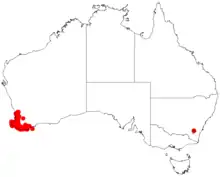| Acacia divergens | |
|---|---|
| Scientific classification | |
| Kingdom: | Plantae |
| Clade: | Tracheophytes |
| Clade: | Angiosperms |
| Clade: | Eudicots |
| Clade: | Rosids |
| Order: | Fabales |
| Family: | Fabaceae |
| Subfamily: | Caesalpinioideae |
| Clade: | Mimosoid clade |
| Genus: | Acacia |
| Species: | A. divergens |
| Binomial name | |
| Acacia divergens | |
 | |
| Occurrence data from AVH | |
Acacia divergens is a shrub belonging to the genus Acacia and the subgenus Phyllodineae that is native to Western Australia.
The diffuse, slender and spiny shrub typically grows to a height of 0.4 to 2.5 metres (1 to 8 ft).[1] It generally has a main trunk and often has long undivided terminal branches that downwards. The branchlets are usually glabrous or slightly haired and finely yellow-ribbed with 2 to 4 millimetres (0.079 to 0.157 in) slender stipules. The evergreen pungent phyllodes have a shallowly obdeltate to obtriangular shape that are 6 to 10 mm (0.24 to 0.39 in) in length and 3 to 8 mm (0.12 to 0.31 in) wide.[2] It blooms from August to November and produces cream-yellow flowers.[1] It has one simple inflorescences per axil. The flower heads have a globular shape containing 5 to 10 cream to yellow flowers. After flowering linear, curved to twisted seed pods form that are up to 7 cm (2.8 in) in length and 2 to 3 mm (0.079 to 0.118 in) wide containing oblong glossy brown seeds that are 2.5 to 3 mm (0.098 to 0.118 in) in length.[2]
A. divergens is part of the A. biflora group and also resembles A. robiniae.[2]
It is found in an area in the southern Wheatbelt, Peel, South West and Great Southern regions of Western Australia that is most often found along watercourses, around swamps and other damp areas[1] although it also is found in drier areas such as loamy laterite in Jarrah forest as well as in coastal heath communities.[2]
See also
References
- 1 2 3 "Acacia divergens". FloraBase. Western Australian Government Department of Biodiversity, Conservation and Attractions.
- 1 2 3 4 "Acacia divergens". World Wide Wattle. CSIRO. Retrieved 12 September 2018.